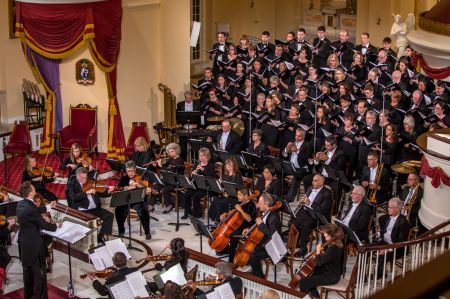Holiday Reflection
The holiday season brings about a bustling time, particularly for us choral folks! Baltimore Choral Arts has experienced this insane Christmas schedule phenomenon; the level of commitment and passion from the chorus has been astounding to watch as we performed our annual Christmas with Choral Arts broadcast performance, collaborated in one of two programs with the Baltimore Symphony, Chamber Singers concerts, caroling in Little Italy, Messiah Sing-along, and Christmas for Kids. This is certainly harvest season for us, and amidst the craziness I am frequently reminded of why we do this amazing work.
Christmas carols and songs bring meaningful messages, and this year’s that strikes me most is the theme of helping marginalized or forgotten people. Charity, helping those who need it, and empathy seem to be a repeated message in many corners of Christmas music traditions. One of my absolute favorite carols is “Good King Wenceslas”, and not just because I spent some time in Prague as a composition student! The text tells of the king and his squire who, in the thick of a raging winter storm, bring food and wine to a poor man who lives “right against the forest fence by St. Agnes’ fountain” and who clearly has inadequate resources to be comfortable on such a harsh, snowy night. The squire is afraid and unconfident, but Wenceslas’ zeal for philanthropy inspires assurance to continue the frigid journey. The theme of the morality-centered text is précised in the carol’s final line: “Ye who now will bless the poor, shall yourselves blessing.”
A similar sentiment exists in a piece we are due to perform with the Baltimore Symphony this Saturday. Alan Silvestri, the celebrated film composer, produced an overlooked masterpiece in his score for the 2009 Disney adaptation of the Dickens classic A Christmas Carol, and chief among the delightful melodies comes from a song entitled “God Bless Us Everyone”, clearly quoting Tiny Tim’s sentiment at the conclusion of Dickens’ beloved story. The most striking lyric to me is the beginning of the second stanza, which says “To the voices no one hears, we have come to find you.” I find it to be a dynamically potent thought that we in this time we might pause and think of unheard voices.
All of these encouraging words that are built into the Christmas music oeuvre is a natural segue thematically to Baltimore Choral Arts’ next big project, David Lang’s little match girl passion on February 10th. Hans Christian Anderson’s tragic tale is brought startlingly to life by Lang’s distinctive compositional language and his paraphrasing of both the Anderson tale and Bach chorales from the St Matthew Passion. Spoiler alert: the little girl selling matches dies in the snow after being unable to sell her product, with onlookers oblivious or apathetic until the worst has happened. The visual art component provided by MICA is stunning in its portrayal of indifference; silhouettes move about in a many-windowed building as the match girl struggles in the cold. It is startling to see and I know it will be a moving and thought provoking part of the concert experience.
The spirit of the texts in the Christmas pieces juxtaposed with the cold, apathetic attitude of observers in the story of the Little Match Girl present a poignant dichotomy. As we explore how we interact, help, ignore, or harm people in need, I hope we all will leave the performances feeling changed, thankful, and willing to help. If we were all quicker to come to the aid of others, that would be a wonderful Christmas gift indeed, for all of us!


